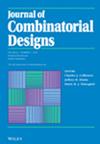下载PDF
{"title":"关于整数Heffter数组上Archdeacon猜想的一个解","authors":"Marco Antonio Pellegrini, Tommaso Traetta","doi":"10.1002/jcd.21983","DOIUrl":null,"url":null,"abstract":"<p>In this article, we make significant progress on a conjecture proposed by Dan Archdeacon on the existence of integer Heffter arrays <span></span><math>\n <semantics>\n <mrow>\n \n <mrow>\n <mi>H</mi>\n \n <mrow>\n <mo>(</mo>\n \n <mrow>\n <mi>m</mi>\n \n <mo>,</mo>\n \n <mi>n</mi>\n \n <mo>;</mo>\n \n <mi>s</mi>\n \n <mo>,</mo>\n \n <mi>k</mi>\n </mrow>\n \n <mo>)</mo>\n </mrow>\n </mrow>\n </mrow>\n </semantics></math> whenever the necessary conditions hold, that is, <span></span><math>\n <semantics>\n <mrow>\n \n <mrow>\n <mn>3</mn>\n \n <mo>⩽</mo>\n \n <mi>s</mi>\n \n <mo>⩽</mo>\n \n <mi>n</mi>\n </mrow>\n </mrow>\n </semantics></math>, <span></span><math>\n <semantics>\n <mrow>\n \n <mrow>\n <mn>3</mn>\n \n <mo>⩽</mo>\n \n <mi>k</mi>\n \n <mo>⩽</mo>\n \n <mi>m</mi>\n </mrow>\n </mrow>\n </semantics></math>, <span></span><math>\n <semantics>\n <mrow>\n \n <mrow>\n <mi>m</mi>\n \n <mi>s</mi>\n \n <mo>=</mo>\n \n <mi>n</mi>\n \n <mi>k</mi>\n </mrow>\n </mrow>\n </semantics></math> and <span></span><math>\n <semantics>\n <mrow>\n \n <mrow>\n <mi>n</mi>\n \n <mi>k</mi>\n \n <mo>≡</mo>\n \n <mn>0</mn>\n \n <mo>,</mo>\n \n <mn>3</mn>\n <mspace></mspace>\n \n <mrow>\n <mo>(</mo>\n \n <mrow>\n <mi>mod</mi>\n <mspace></mspace>\n \n <mn>4</mn>\n </mrow>\n \n <mo>)</mo>\n </mrow>\n </mrow>\n </mrow>\n </semantics></math>. By constructing integer Heffter array sets, we prove the conjecture in the affirmative whenever <span></span><math>\n <semantics>\n <mrow>\n \n <mrow>\n <mi>k</mi>\n \n <mo>⩾</mo>\n \n <mn>7</mn>\n \n <mo>⋅</mo>\n \n <mtext>gcd</mtext>\n \n <mrow>\n <mo>(</mo>\n \n <mrow>\n <mi>s</mi>\n \n <mo>,</mo>\n \n <mi>k</mi>\n </mrow>\n \n <mo>)</mo>\n </mrow>\n </mrow>\n </mrow>\n </semantics></math> is odd and <span></span><math>\n <semantics>\n <mrow>\n \n <mrow>\n <mi>s</mi>\n \n <mo>≠</mo>\n \n <mn>3</mn>\n \n <mo>,</mo>\n \n <mn>5</mn>\n \n <mo>,</mo>\n \n <mn>6</mn>\n \n <mo>,</mo>\n \n <mn>10</mn>\n </mrow>\n </mrow>\n </semantics></math>.</p>","PeriodicalId":15389,"journal":{"name":"Journal of Combinatorial Designs","volume":"33 8","pages":"310-323"},"PeriodicalIF":0.8000,"publicationDate":"2025-05-20","publicationTypes":"Journal Article","fieldsOfStudy":null,"isOpenAccess":false,"openAccessPdf":"https://onlinelibrary.wiley.com/doi/epdf/10.1002/jcd.21983","citationCount":"0","resultStr":"{\"title\":\"Toward a Solution of Archdeacon's Conjecture on Integer Heffter Arrays\",\"authors\":\"Marco Antonio Pellegrini, Tommaso Traetta\",\"doi\":\"10.1002/jcd.21983\",\"DOIUrl\":null,\"url\":null,\"abstract\":\"<p>In this article, we make significant progress on a conjecture proposed by Dan Archdeacon on the existence of integer Heffter arrays <span></span><math>\\n <semantics>\\n <mrow>\\n \\n <mrow>\\n <mi>H</mi>\\n \\n <mrow>\\n <mo>(</mo>\\n \\n <mrow>\\n <mi>m</mi>\\n \\n <mo>,</mo>\\n \\n <mi>n</mi>\\n \\n <mo>;</mo>\\n \\n <mi>s</mi>\\n \\n <mo>,</mo>\\n \\n <mi>k</mi>\\n </mrow>\\n \\n <mo>)</mo>\\n </mrow>\\n </mrow>\\n </mrow>\\n </semantics></math> whenever the necessary conditions hold, that is, <span></span><math>\\n <semantics>\\n <mrow>\\n \\n <mrow>\\n <mn>3</mn>\\n \\n <mo>⩽</mo>\\n \\n <mi>s</mi>\\n \\n <mo>⩽</mo>\\n \\n <mi>n</mi>\\n </mrow>\\n </mrow>\\n </semantics></math>, <span></span><math>\\n <semantics>\\n <mrow>\\n \\n <mrow>\\n <mn>3</mn>\\n \\n <mo>⩽</mo>\\n \\n <mi>k</mi>\\n \\n <mo>⩽</mo>\\n \\n <mi>m</mi>\\n </mrow>\\n </mrow>\\n </semantics></math>, <span></span><math>\\n <semantics>\\n <mrow>\\n \\n <mrow>\\n <mi>m</mi>\\n \\n <mi>s</mi>\\n \\n <mo>=</mo>\\n \\n <mi>n</mi>\\n \\n <mi>k</mi>\\n </mrow>\\n </mrow>\\n </semantics></math> and <span></span><math>\\n <semantics>\\n <mrow>\\n \\n <mrow>\\n <mi>n</mi>\\n \\n <mi>k</mi>\\n \\n <mo>≡</mo>\\n \\n <mn>0</mn>\\n \\n <mo>,</mo>\\n \\n <mn>3</mn>\\n <mspace></mspace>\\n \\n <mrow>\\n <mo>(</mo>\\n \\n <mrow>\\n <mi>mod</mi>\\n <mspace></mspace>\\n \\n <mn>4</mn>\\n </mrow>\\n \\n <mo>)</mo>\\n </mrow>\\n </mrow>\\n </mrow>\\n </semantics></math>. By constructing integer Heffter array sets, we prove the conjecture in the affirmative whenever <span></span><math>\\n <semantics>\\n <mrow>\\n \\n <mrow>\\n <mi>k</mi>\\n \\n <mo>⩾</mo>\\n \\n <mn>7</mn>\\n \\n <mo>⋅</mo>\\n \\n <mtext>gcd</mtext>\\n \\n <mrow>\\n <mo>(</mo>\\n \\n <mrow>\\n <mi>s</mi>\\n \\n <mo>,</mo>\\n \\n <mi>k</mi>\\n </mrow>\\n \\n <mo>)</mo>\\n </mrow>\\n </mrow>\\n </mrow>\\n </semantics></math> is odd and <span></span><math>\\n <semantics>\\n <mrow>\\n \\n <mrow>\\n <mi>s</mi>\\n \\n <mo>≠</mo>\\n \\n <mn>3</mn>\\n \\n <mo>,</mo>\\n \\n <mn>5</mn>\\n \\n <mo>,</mo>\\n \\n <mn>6</mn>\\n \\n <mo>,</mo>\\n \\n <mn>10</mn>\\n </mrow>\\n </mrow>\\n </semantics></math>.</p>\",\"PeriodicalId\":15389,\"journal\":{\"name\":\"Journal of Combinatorial Designs\",\"volume\":\"33 8\",\"pages\":\"310-323\"},\"PeriodicalIF\":0.8000,\"publicationDate\":\"2025-05-20\",\"publicationTypes\":\"Journal Article\",\"fieldsOfStudy\":null,\"isOpenAccess\":false,\"openAccessPdf\":\"https://onlinelibrary.wiley.com/doi/epdf/10.1002/jcd.21983\",\"citationCount\":\"0\",\"resultStr\":null,\"platform\":\"Semanticscholar\",\"paperid\":null,\"PeriodicalName\":\"Journal of Combinatorial Designs\",\"FirstCategoryId\":\"100\",\"ListUrlMain\":\"https://onlinelibrary.wiley.com/doi/10.1002/jcd.21983\",\"RegionNum\":4,\"RegionCategory\":\"数学\",\"ArticlePicture\":[],\"TitleCN\":null,\"AbstractTextCN\":null,\"PMCID\":null,\"EPubDate\":\"\",\"PubModel\":\"\",\"JCR\":\"Q3\",\"JCRName\":\"MATHEMATICS\",\"Score\":null,\"Total\":0}","platform":"Semanticscholar","paperid":null,"PeriodicalName":"Journal of Combinatorial Designs","FirstCategoryId":"100","ListUrlMain":"https://onlinelibrary.wiley.com/doi/10.1002/jcd.21983","RegionNum":4,"RegionCategory":"数学","ArticlePicture":[],"TitleCN":null,"AbstractTextCN":null,"PMCID":null,"EPubDate":"","PubModel":"","JCR":"Q3","JCRName":"MATHEMATICS","Score":null,"Total":0}
引用次数: 0
引用
批量引用

 求助内容:
求助内容: 应助结果提醒方式:
应助结果提醒方式:


